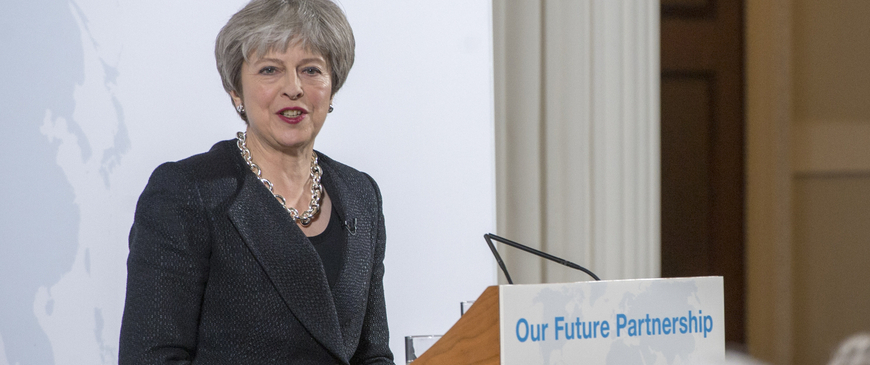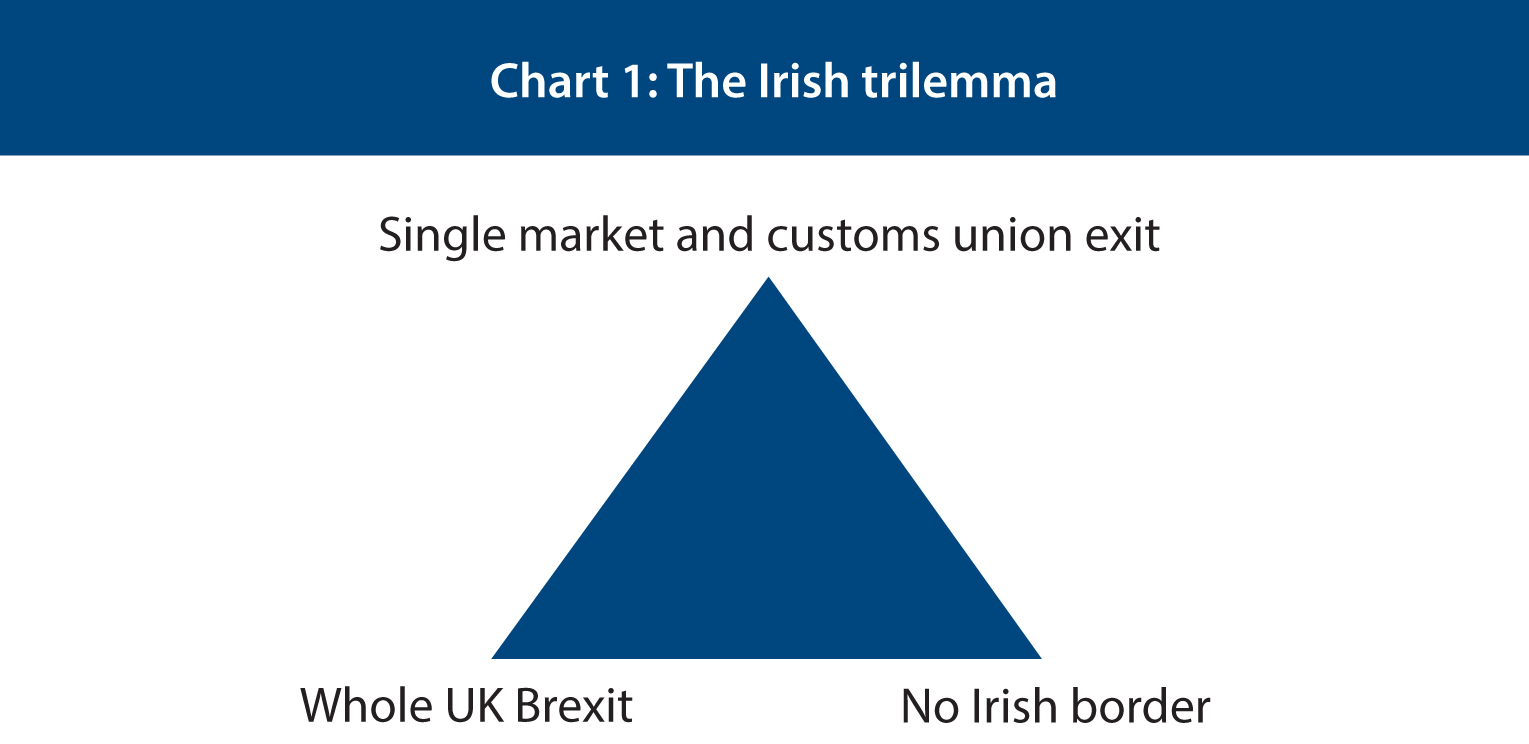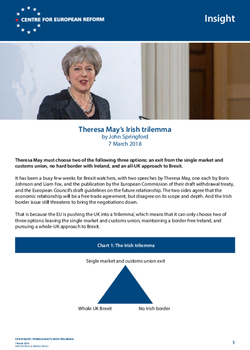
Theresa May's Irish trilemma
Theresa May must choose two of the following three options: an exit from the single market and customs union, no hard border with Ireland, and an all-UK approach to Brexit.
It has been a busy few weeks for Brexit watchers, with two speeches by Theresa May, one each by Boris Johnson and Liam Fox, and the publication by the European Commission of their draft withdrawal treaty, and the European Council’s draft guidelines on the future relationship. The two sides agree that the economic relationship will be a free trade agreement, but disagree on its scope and depth. And the Irish border issue still threatens to bring the negotiations down.
That is because the EU is pushing the UK into a ‘trilemma’, which means that it can only choose two of three options: leaving the single market and customs union, maintaining a border-free Ireland, and pursuing a whole-UK approach to Brexit.

The UK could stop an Irish border from being erected while leaving the single market and customs union. It could agree to a ‘special status’ for Northern Ireland, which would remain inside the EU’s customs union and continue to sign up to EU rules covering agriculture, goods and value-added tax, among other things needed to maintain the “all-island economy”. This is one of the options that the EU set out in detail in last week’s draft withdrawal treaty. It would entail an EU border between Northern Ireland and the rest of the UK. Northern Ireland’s Democratic Unionist Party (DUP), which props up the Conservative minority government, might withdraw its support if May agreed to the EU's proposal. The Tory right could also revolt.
Alternatively, Theresa May could refuse to split the UK in this way. She could take all of the UK out of the single market and customs union and try to negotiate as soft a border as possible, using camera technology and online form-filling, a ‘trusted trader’ scheme and risk-based checks at lorry parks away from the border. This is the option that Boris Johnson prefers, judging by a letter to the prime minister that was leaked late last month. But it would violate the UK’s vow to avoid “any physical infrastructure or related checks and controls” made in the Joint Report by the UK and the EU-27, published in December. It is not apparent that Ireland and the rest of the 27 would accept that.
The prime minister’s final choice would be to perform the mother of all u-turns, and keep all of the UK in the single market and customs union, which would eliminate the need for a border. This would almost certainly result in a leadership challenge.
In her speech, May repeated the UK government's proposals on customs made in an options paper published last summer: use technology, and exempt small and medium sized businesses which conduct 80 per cent of cross-border trade from customs procedures. She also said that the UK would seek to maintain the EU’s rules governing chemicals, aviation and medicines by remaining in the agencies that create standards for these sectors, while the EU and UK should agree mutual recognition of each other’s regulations and standards in other areas, such as finance and cars; and if the UK diverged from the EU’s approach, the EU would be able to restrict market access. In effect, she denied the existence of the Irish trilemma, claiming that technology, turning a blind eye to smuggling and comprehensive mutual recognition would alleviate the need for an Irish border.
Theresa May must choose two of three options: a single market and customs union exit, no hard border in Ireland, and an all-UK Brexit.
Theresa May’s speech will go down in history in the usual way: unrealistic demands that are rejected by the EU, followed by a period of stand-off. But this situation is different to December 2017, when May agreed to the Brexit bill. Theresa May may not be able to cave to the EU’s demands.
In the draft guidelines, published today, Council officials reiterated the no cherry-picking mantra, saying that there should be no participation based on a “sector-by-sector approach”. They ruled out participation in any EU agencies. The EU would countenance regulatory co-operation and equivalence rulings in goods standards and food hygiene, but not mutual recognition (equivalence rulings are unilateral and can be withdrawn by the EU). Finance went unmentioned, but trade in services would be determined by “host state rules”, meaning that the UK would have the same access to the EU’s services markets as any third country. There would be recognition of professional qualifications and some rights to move staff around (as there had been in the Canada-EU free trade agreement). And for tariff and quota-free trade in goods, fisheries and agriculture, the EU demanded that the UK should not diverge “from current levels of protection with respect to competition and state aid, tax, social, environment and regulatory measures and practices”.
Thus the EU continues its practice of making an example of the UK, making strategic use of inflexible legalism to make Out much worse than In, while protecting the EU’s economic interests as much as possible. The Council called for access to public procurement markets – French and German companies win many UK government contracts. Investment and intellectual property rights, including the EU’s much-maligned geographical indicators regime, would need to be protected. And UK airlines would be free to fly “between the UK and the EU”, but no mention was made of flying between airports within the EU. If the UK’s red lines were to “evolve”, the 27 could be open to changing their offer.
Today’s (7/3/18) European Council guidelines confirm that the EU will press for a special status for Northern Ireland, unless May’s red lines “evolve”.
Taken together, the draft withdrawal treaty and the guidelines for the future relationship mean that either Ireland will have to accept border infrastructure, or that there will have to be a special status for Northern Ireland. In the guidelines, the Council says that the EU will seek customs co-operation, but that it must “preserve the regulatory and jurisdictional autonomy of the parties” – code for checks to ensure that goods crossing the border meet EU standards – and customs procedures must also preserve “the integrity of the EU customs union” – code for border enforcement that prevents smuggling and VAT fraud. This means that a physical border will be needed between Britain and the 27. The draft withdrawal treaty outlines what a special status for Northern Ireland would be: membership of the customs union; EU rules and standards in goods, agriculture and electricity; participation in the VAT and excise regime; and jurisdiction of the European Court of Justice over those rules. The European Commission has been at pains to say that if the UK can suggest ways in which technology or customs collaboration can prevent a border, it will be willing to listen. But it is sceptical.
The guidelines also called for “intensified efforts” to solve the withdrawal issues and insisted that progress to transition and trade talks are require “commitments undertaken so far [to be] respected in full”. Theresa May is being forced to pick two options in the Irish trilemma. So far, the signs are that the 27 will continue to back up Ireland, and press for a special status for Northern Ireland. They will argue this is the only way to reconcile the UK’s decision to leave the customs union and single market with the joint promise to avoid infrastructure at the border. Given the DUP’s hostility to the idea – and that of Tory hardliners – resolving the Irish trilemma could lead to May’s downfall.
John Springford is deputy director of the Centre for European Reform.


Comments
The suggestion that "physical infrastructure" will make a return to the island of Ireland with respect to the UK/ROI border has already been agreed as part of phase I as a non-starter.
Physical infrastructure implies a UK exit from the single-market and customs union - hence Ireland's primary economic interest - with GB is already damaged.
Quite why we would concede to Tory and DUP inability to "interalise the logic" of the phase I Brexit deal is anybody's guess.
With the Prime Minister publicly declaring that no deal is off the table (though confusingly then repeating "no deal is better than a bad deal") we can be reasonably sure that - as in December - when it comes to it, HMG will choose to cut NI loose.
Given that HMG is likely to be replaced by Corbyn (who takes his marching orders from the IRA army council according to the Brexit press) we can expect the general "glide path" to be :
1. The Tories continue in office for a while longer
2. The Tories get bounced out
3. Labour takes over and sorts out this mess by committing the UK to the customs union and most of the single market.
May should just resign now and do the UK, Ireland and the rest of Europe a gigantic favour and who knows maybe history will judge here slightly more kindly - having had the maturity to know when to exit the stage.
The EU is not pushing the UK anywhere. The UK decided long ago that it wanted an open land border in Ireland, the EU agreed. This is a point of complete agreement between the two sides. The UK decision to leave the single market and customs union is what has pushed the UK into this "trilemma". The EU did not demand that the UK leave the single market and customs union, nor did it demand that the UK create a special status for Northern Ireland. The UK has hubristically claimed it can take the whole UK out of the customs union and single market, and keep the border open, when the EU asks it for a plan to do this, the UK produces nothing but platitudes.
The UK has made this particular bed all by itself, it has painted itself into a corner. It is simply wrong to try to blame the EU for pushing the UK into anything. The UK is incompetent enough to have created this mess all by itself!
Add new comment